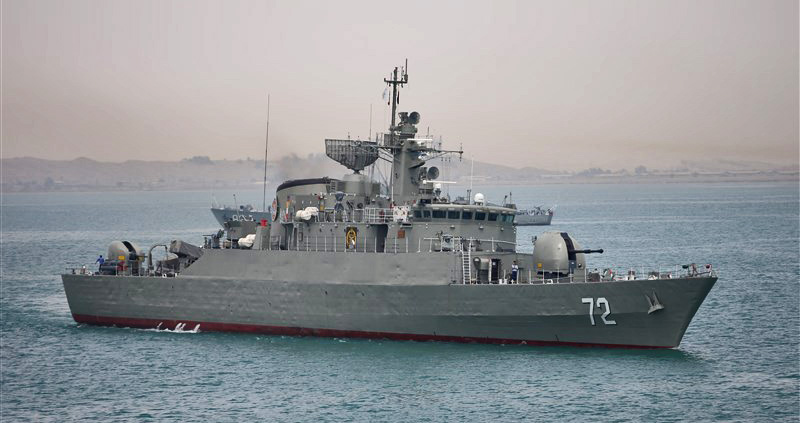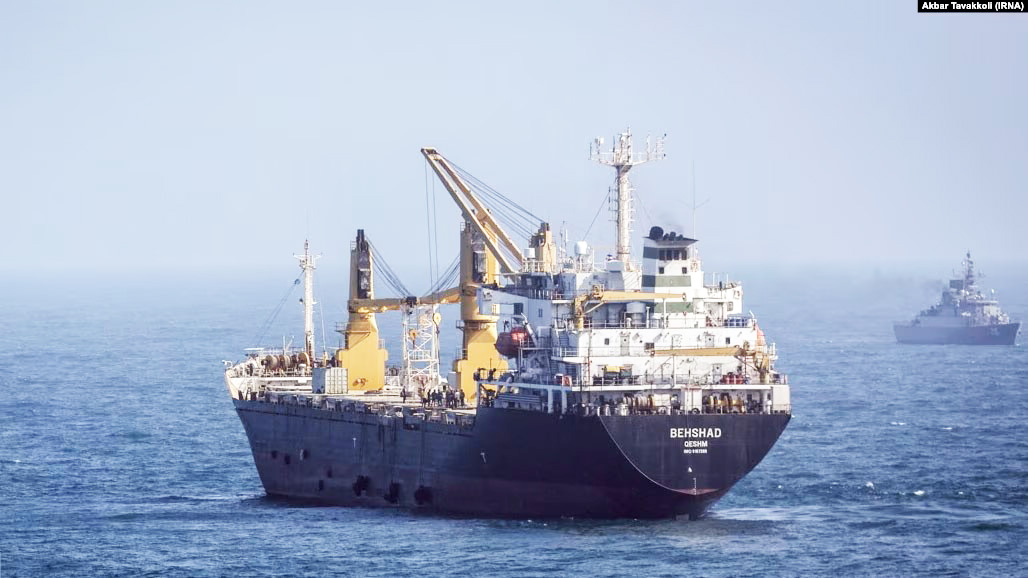Sudan and Iran dismiss talk of Red Sea naval base as ‘scuttlebutt’

Iranian Navy destroyer Alborz, currently deployed in the Red Sea (Photo: Taznim news agency)
Iran has denied attempting to entice Sudan to allow it to establish a naval base on the strategic Red Sea coast, a day after Sudan’s Foreign Ministry issued a similar denial. The respective rebuttals from Port Sudan and Teheran follow a report by the Wall Street Journal on Sunday, citing “a senior Sudanese intelligence official”, who alleges that Sudan turned down overtures from Iran, which included a pledge of a warship in exchange, to establish a permanent naval base on Sudan’s Red Sea coast.
Iranian Foreign Ministry spokesman Nasser Kinani told a news conference yesterday that the report was “baseless and politically motivated”. Following the appearance of the WSJ report on Monday, Sudan’s acting Minister of Foreign Affairs refuted the story as “lies” and “fabricated.”
According to the report, Sudan rejected Iran’s offer for fear of angering the USA and Israel. Iran has already supplied the Sudanese Armed Forces (SAF) with Mohajer 6 drones, which experts told Radio Dabanga have contributed to the progress the SAF is now making in Omdurman.
The paramilitary Rapid Support Forces (RSF) claim to have shot down or neutralised several of these drones.
Iran’s navy has maintained a presence in the Red Sea for years, but has no naval base in these strategic waters. While two of its warships docked in Port Sudan in 2021, Iran denies applying to Sudan for a naval base.

Commercial shipping traffic in the Red Sea has been hampered since November, when Yemen’s Iran-backed Houthis began targeting Israeli-linked vessels. Analysts say Tehran used its spy ship Behshad in the Gulf of Aden to provide the Houthis with intelligence.
As previously reported by Radio Dabanga, on February 6, Iranian President Ebrahim Raisi received Sudan’s acting Foreign Minister Ali El Sadig in Tehran, confirming the restoration of mutual relations after a hiatus of seven years.
In October last year, Sudan and Iran announced their decision to restore diplomatic relations, marking the end of a seven-year hiatus. Two months later, Radio Dabanga reported that a SAF delegation allegedly visited Iran to purchase Iranian-made combat drones. In end January, the Rapid Support Forces (RSF) said they downed a Iranian-made Mohajer-6 drone in Khartoum state.
Khartoum severed ties with Iran in 2016, following the deterioration of Saudi-Iranian relations. Khartoum had fostered good relations with Iran since the regime under Omar Al Bashir came into power via a coup d’état in 1989. Yet, the relations cooled down in March 2016, after Sudan opted to support Saudi Arabia in its military campaign against Shiite Houthi insurgents in Yemen.
In end 2020, Sudan normalised its relations with Israel. The Council of Ministers headed by PM Abdallah Hamdok denied a connection with the USA removing Sudan from its list of State Sponsors of Terrorism. In February that year, the chair of the Sovereign Council, Lt Gen Abdelfattah El Burhan, and Israeli Prime Minister Benjamin Netanyahu met in Entebbe in Uganda.
Red Sea coast
The strategic importance of Port Sudan has been highlighted most recently amid rising security concerns for shipping in the Red Sea, where the Iran-backed Houthi movement within Yemen has staged multiple attacks and seizures of civilian-operated cargo ships sailing near the Yemeni coast.
In the past, both the USA and Russia have shown interest in Port Sudan, in terms of controlling and monitoring shipping in the Red Sea. In 2021, US Military Maritime Transport Command USNS Carson City docked in Port Sudan, representing the first visit by a US Navy ship for decades.
A week later, the US Warship USS Winston Churchill docked in Port Sudan, while the next day, a Russian frigate was received in the port with similar honours.
Plans to establish Russian military infrastructure on the shores of Suakin, 63km south of Port Sudan, date back to 2017, to a high-profile visit by the since deposed dictator, Omar Al Bashir, to Russia in November of that year.
Operations to construct the military base were scheduled to begin four years ago, when initial agreements were finalised in 2020. As per the agreement, Sudan was supposed to provide Russia with an area to deploy 300 Russian military personnel, four ships, and an “unlimited number” of ships in the region for a period of 25 years, in exchange for weapons.
The facility was intended to be a logistics post for the Russian navy, which would allow the placement of large ships and nuclear submarines.
However, following the outbreak of the war between the SAF and RSF in April 2023, those planse have been “indefinitely shelved”.
Parliamentary ratification of the agreement failed several times, and despite initial hopes in early 2023, the signing of the treaty was indefinitely postponed when fighting broke out in April of that year.











 and then
and then